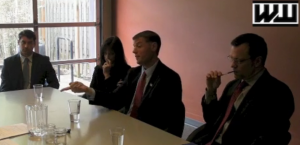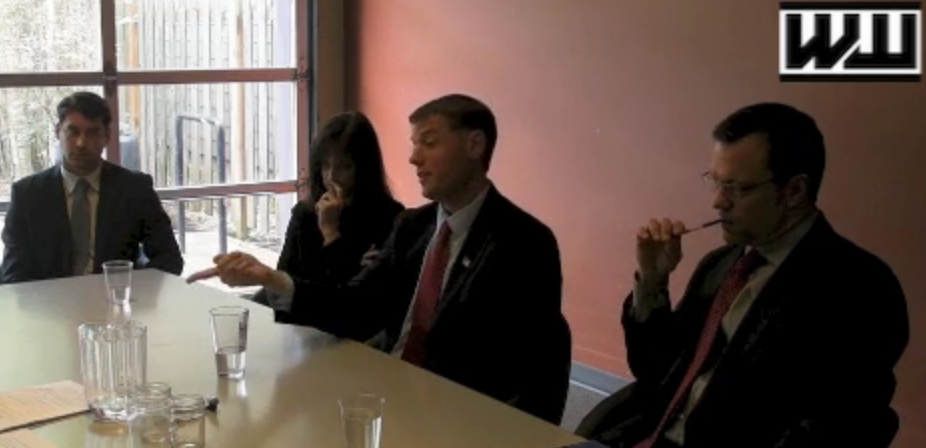Candidate calls media on their games, but here are more moves for his playbook.

I know he didn’t ask, but I’m giving Mark Callahan some advice anyway. I figure if a candidate for higher office this year thought my advice was worth paying for, then maybe Callahan will value my input.
First, the housekeeping. In case you don’t know the back story, Mr. Callahan, a candidate in the Republican primary for US Senate, was tossed out of an endorsement interview with Willamette Week. See the video below.
US Senate
This is “US Senate” by wweek.vimeo on Vimeo, the home for high quality videos and the people who love them.
Candidates were on one side of the table (with Jo Rae Perkins on the phone) while Willamette Week Editor in Chief Mark Zusman, Managing Editor Brent Walth and star reporter Nigel Jacquiss were arrayed on the other.
Things got a little sparky starting at 53:17 when Callahan questioned why only two candidates, Monica Wehby and Jason Conger, were getting most of the questions.
“We came to be interviewed…it’s not the Monica and Jason show,” Callahan complained.
I believe it was Brent Walth who then said “if you don’t want to be here, you don’t have to be here.” Callahan shot back, “I’m just requesting some respect for it not being the Monica and Jason show.”
Gauntlet thrown.
But his query had its desired effect. Soon all the candidates were asked what they would cut in the federal budget (see more below). When it got to Callahan he expounded on the president misusing the EPA whereupon at 57:40 he was asked a question which sounded like, “What’s the EPA?”
Sensing he was being mocked, Callahan shot back, “the Environmental Protection Agency, I think you would have heard of that.”
At 1:03:49 Jo Rae Perkins was asked what she would cut from the budget. But during her answer, Callahan asserted WW was being disrespectful. Nigel Jacquiss retorted (1:04:23) “if you don’t like that, I’m sorry…”
He may as well have challenge him to a duel. It was ON.
A moment of chaos ensued with everyone talking over one another and fingers being pointed. Order was eventually restored while Jo Rae continued her answer.
As the candidates looked down to concentrate on Perkins’ answer, Callahan’s eyes fell on Jacquiss’ notebook which lay flat on the table.
That’s when it happened. Callahan pounced,
“You want to talk about disrespect. You just wrote down blah, blah, blah. You have to give respect to get respect. Right now on that side of the table, you’re not giving us very much respect.”

Instead of apologizing or sounding embarrassed, the next voice from Willamette Week’s side of the table invoked a threatening tone.
Walth: Mark let me ask you a question, do you believe in climate change. Is is a myth or reality?
Callahan: It’s a myth.
Walth: A myth?
Callahan: Yes.

Jacquiss: Where are you on the Easter Bunny?
Callahan: What’s that?
Jacquiss: Where are you on the Easter Bunny?
Callahan: Are these really the questions I was called here to answer? Really? I called you out on the blah, blah, blah and you ask me questions like this? Really, really? Are we talking about this now? OK, how about you ask me a serious question instead of asking me a childish question?

Walth: I just asked you a question about climate change. ‘kay? That’s two strikes. I’m going to ask you to leave.”
Callahan: (scoffs) Who do you think you are?
Editor: Ok, you may leave now. Go ahead. You’re done here. This is neither a fair or [sic] balanced meeting. This is a meeting for us…
Callahan: I know. …it’s a meeting…asked by thin skinned liberals like yourself.
Zusman: There’s the door
Now for my unsolicited advice.
Contact the publication in advance to determine who will be at the table and the general nature of the questions that will be asked. It doesn’t hurt to ask and it can only help you prepare.
Good for you for calling out Nigel Jacquiss for writing his “blah blah blah” comment about one of your opponents in the Oregon Republican primary. Jacquiss is an excellent reporter, but even excellent reporters need to have a reality check now and again. It was absolutely appropriate to highlight this. Your sense of outrage was palpable.
Ask these guys to define their terms. What does the editor mean when he asks about “climate change?” To what climate change does he refer? Global warming or global cooling or…? Never fall for open ended, black hole questions. Say, “when you talk about the politically explosive ‘climate change’ issue, what specifically are you referring to? When you don’t get their cards on the table you allow reporters to expand the parameters of the issue after an interview. They seldom report the issue to a conservative candidate’s satisfaction. This is what Politi”fact” does. A person makes an assertion and the reporter later expands an issue beyond the scope of your answer, thus distorting your original statement. It’s unethical, but there it is.
Don’t accept the premise of a question if it doesn’t comport with your understanding of an issue. Ask the reporter to re-ask the question to give them an opportunity to hone it. If you don’t agree with the premise of the question at this point, you re-state it and answer your own question.
Don’t be demeaning. You were being mocked on the EPA question, but don’t lower yourself to reporter’s level. If you can’t abide it, preface your answer by saying, “I sense Mr. Walth’s contempt but I’ll answer his question by saying…”
Be specific. When you think WW is “unfair” and “disrespectful,” be specific about why. While you were specific on a couple of occasions during this exchange, make sure you re-state every time while you think something is disrespectful. Use the “when you say this…you are disrespectful.” They’ll still get techy and it will sound like a counseling session, but so what? You’ll be on the moral high ground–and it will be on the record.
Ask them questions when their interview is winding down. Did they ask these same questions about cutting the budget, climate change, ObamaCare votes of the Democrats? That’s a question worth asking in these kinds of settings. Did they ask Senator Jeff Merkley why he wrote a letter siccing the IRS onTea Party groups? Ask them where their publication was on that issue. Ask them if they think that’s fair.
Don’t fall for false choice questions. Ask reporters if those are the only choices they see. This does a couple of things. It makes them see that their questions are restrictive and allows you to expand your answer.
Be a warrior, but be a happy warrior. A few years ago I was in the audience watching a debate between two folks running for Congress. I sat next to a US Congressman who occasionally chimed in with commentary. At one point the Congressman said under his breath, ‘If you’re not likeable, nobody will vote for you.’
One contestant came off as a happy, competent warrior and the other like an angry man. Guess who was adjudged the winner? Not the surly, cranky pants candidate.
Ask the other candidates to come with you next time. WW was being unfair and sparky and clearly had an agenda. You were willing to fight it. Constituents see that and see a man willing to fight for them and for what’s right. The others were just going along to get along. Ask them to join you if there’s ever a next time.
In most cases, call back the reporter and ask if they have any further questions or anything you can more fully explain. Ask if they were confused about any of your answers. Use this opportunity to change an answer you believe you didn’t properly articulate.
Don’t let this be your last run for office. Do it again.
This is enough for now.




